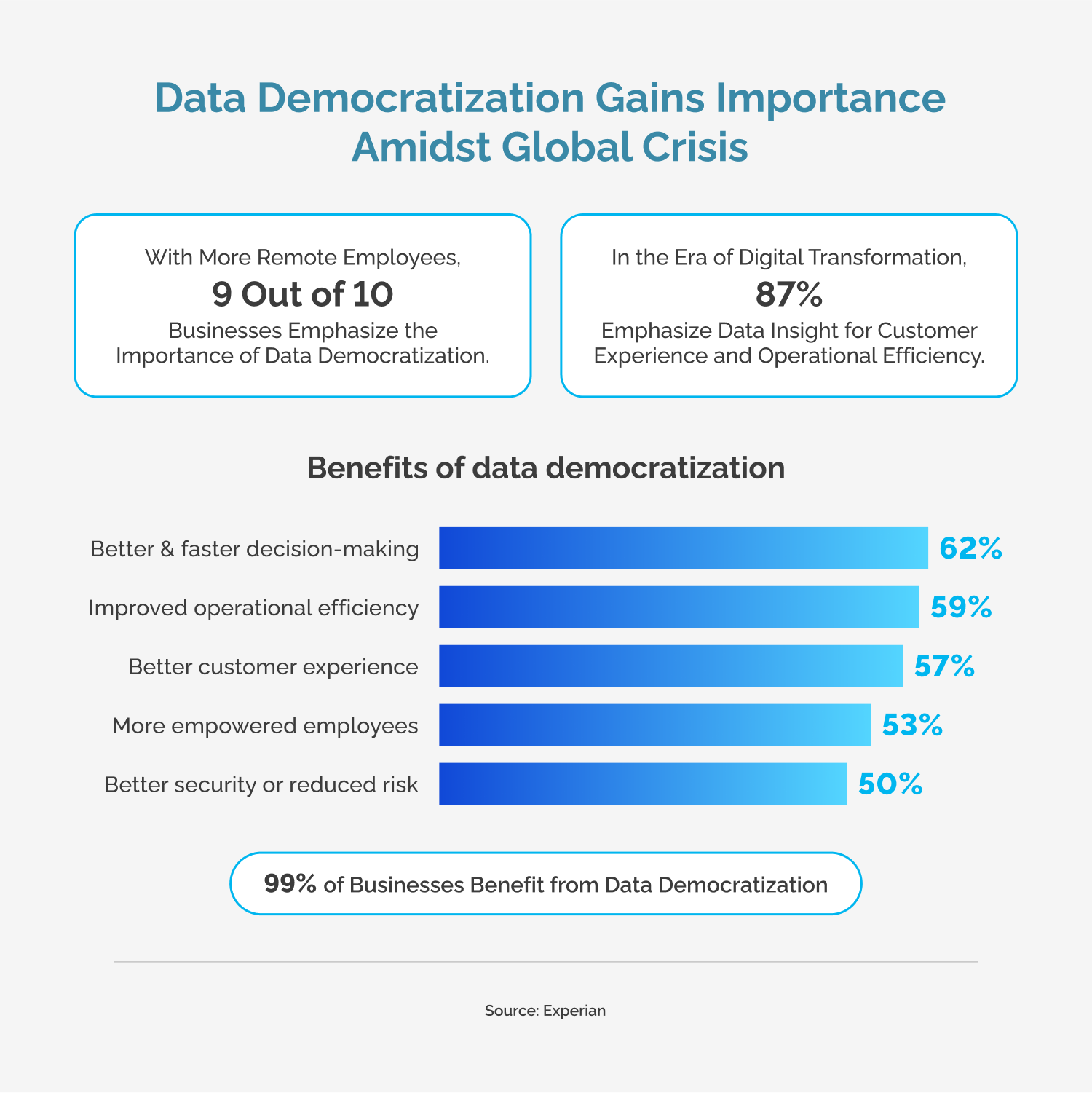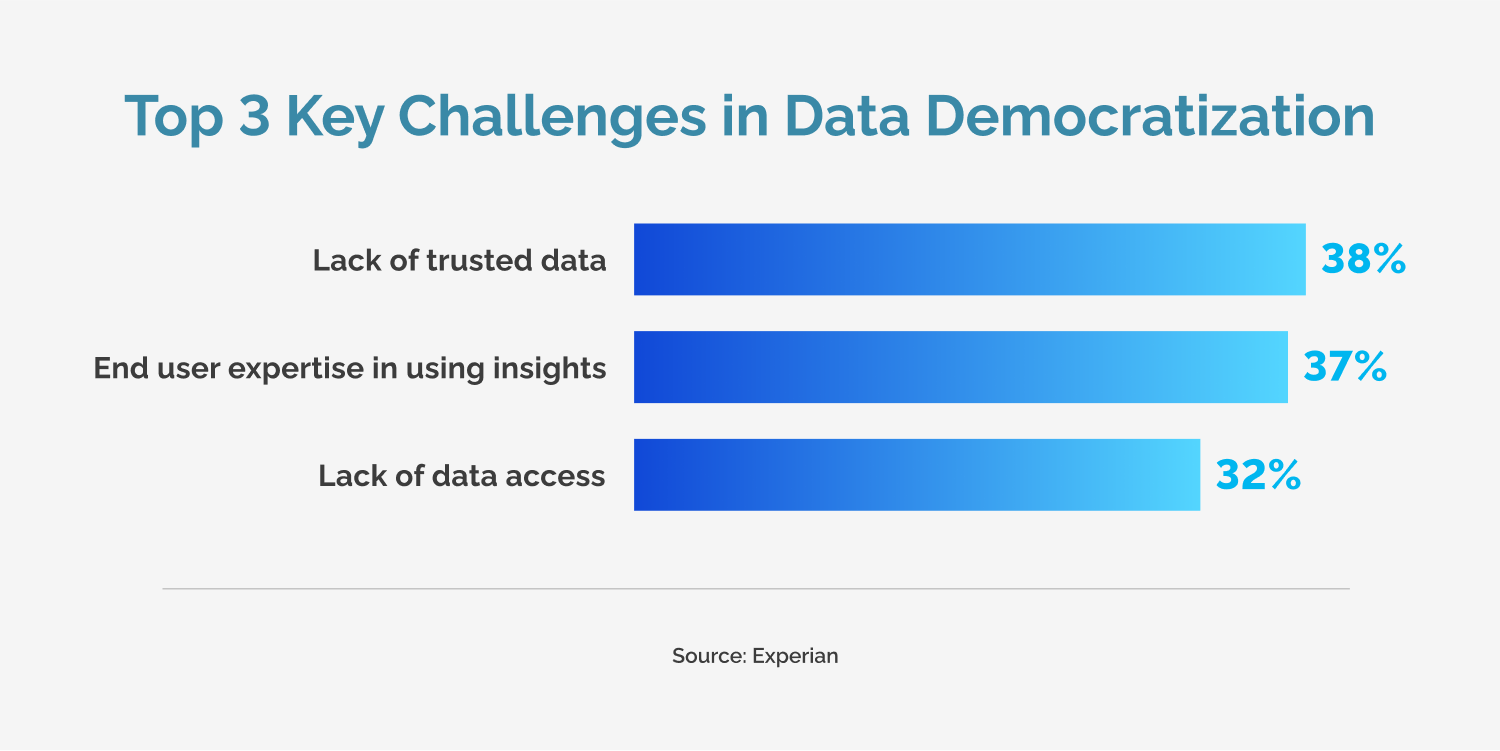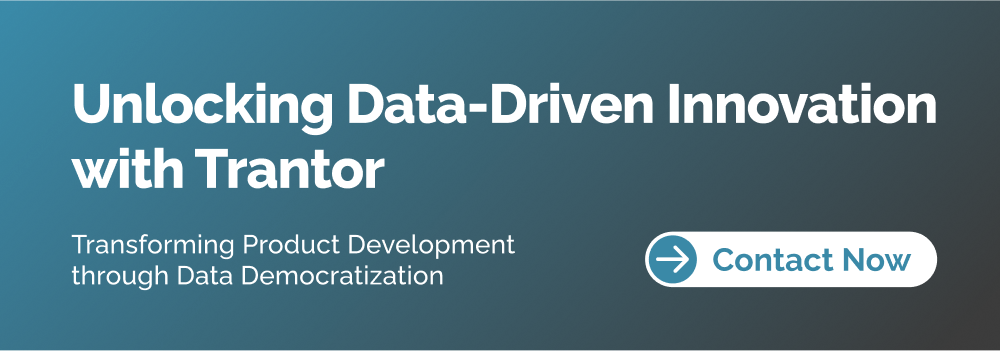Digital Transformation, zBlog
Data Democratization: Transforming Decision-Making in the Digital Age
atif | Updated: October 26, 2023

Introduction
We live in an era dominated by data. As organizations rapidly digitize, the amount of data being generated, stored, and analyzed is growing at an exponential rate. Recent research shows that the global data sphere is expected to grow from 33 zettabytes in 2018 to 175 zettabytes by 2025. With data emerging as the new oil that fuels business growth, organizations are realizing the need to tap into their data assets and harness insights to gain a competitive edge. This has led to the rise of data democratization – the concept of making data accessible to everyone across an organization, rather than confined to just analytics teams. Data democratization is transforming traditional decision-making processes and shaping the digital future.
The Need for Data Democratization
Several factors are driving the growing need for data democratization:
- Massive data growth:With data volumes increasing exponentially, organizations cannot rely solely on specialized analytics teams to extract insights. They need to enable different business units to access and analyze data.
- Agility and efficiency: Decentralized decision-making powered by data insights facilitates increased organizational agility and faster responses to market changes.
- Data-driven culture:Easy access to data for all employees fosters a culture of data-driven decision-making across different levels, leading to enhanced productivity.
- Customer-centricity: It breaks information silos, providing a unified customer view. This helps organizations better understand and serve their customers.
According to Dresner Advisory Services, 73% of organizations state that data democratization has improved decision-making capabilities. 69% report increased organizational agility enabled by easy data access.
However, currently, only 33% of companies have a data democratization strategy in place, revealing a significant gap between recognition of need and actual implementation.
The Pillars of Data Democratization
Constructing a robust framework for data democratization rests on three key pillars:
1. Data Warehousing
A data warehouse serves as the central repository for integrating data from disparate sources across the organization. The data can include transactional data, behavioral data, social data, and more.
With data consolidated in a single warehouse, different teams can access the information they need. The warehouse also enables unified analytics and reporting.
Steps to build an effective data warehouse:
- Determine business requirements
- Design data model (star/snowflake schema)
- Extract, transform, and load data
- Ensure data quality and governance
- Implement metadata management
- Make data accessible with SQL and BI tools
2. Self-Service Analytics
This shifts analytics from specialized teams to business users across an organization. With intuitive Business Intelligence tools and dashboards, employees can slice and dice data, visualize insights, and make data-driven decisions, all without coding skills.
Gartner predicts the number of self-service analytics users will grow by 50% by 2025. Companies like Tableau, Microsoft Power BI, and Qlik are driving this democratization of analytics.
3. Data Literacy

For employees to fully leverage self-service analytics and steer business strategy based on data, organizations need to actively invest in data literacy.
Data literacy involves equipping staff with:
- Knowledge of company data and KPIs
- Ability to interpret data and spot trends
- Skills to communicate insights from data analysis
Data literacy enables fact-based decision-making at all levels, fully actualizing the potential of data democratization.
The Business Impact of Data Democratization
When made accessible to all stakeholders, data can drive significant business value in multiple ways:

- Enhanced Decision-Making
Data allows decisions based on facts, not intuitions. Marketing teams can optimize campaigns based on performance data. Support teams can spot customer issues early based on usage metrics. Executives can track KPIs to guide strategy.
73% of companies report data democratization has improved decision-making in their organization. - Increased Agility
Data democratization breaks centralized hierarchies. With access to real-time data, any team can respond rapidly to changes in customer demands or market dynamics without bureaucratic approvals.
This facilitates lean and agile ways of working. 69% of organizations confirm that data democratization has made them more agile. - Improved Customer Experiences
A unified data platform provides a 360-degree customer view. Sales teams can access support interactions. Marketing sees web usage data. Service teams have order information.
This powers hyper-personalization and proactive customer service. 65% of firms state data democratization has enhanced their customer experience. - Higher Operational Efficiency
Data helps identify inefficiencies in processes and operations. Manufacturing units can minimize downtime based on sensor data analytics. Supply chain teams can optimize logistics based on delays or wastage.
Easy data access allows employees at all levels to improve their productivity and decision quality. - Reduced Costs
With data democratization, business teams are not dependent on IT or consultants for basic reports and dashboards. They can diagnose issues and find solutions faster themselves. - According to Gartner, self-service analytics reduces reporting costs by up to 90%.
Key Challenges in Data Democratization

While data democratization delivers immense value, it also comes with some key challenges organizations should be aware of
- Fragmented Data Silos
Entrenched organizational silos can hamper easy data access and sharing across teams. A unified data platform with robust access control is essential. - Lack of Data Literacy
Expecting employees to analyze data without equipping them with skills and knowledge will limit the value realized from democratization initiatives. - Information Security
Opening up data access raises potential cyber risks. Strong data governance and access controls are vital to prevent misuse while sharing data securely. - Resistance to New Ways of Working
Empowering employees with data can challenge existing power dynamics. Leadership must foster a culture that embraces data-driven decision-making at all levels.
The Critical Role of Data Architecture
The foundational pillar that makes it all possible is sound data architecture. The optimal data architecture provides rapid and flexible access to quality data for business users while maintaining governance and security.
Key elements of a robust modern data architecture include:
- Flexible data pipelines for streaming and batch data ingestion
- Scalable data lake for storing raw data
- Metadata management for data discovery
- Data warehouse for structured data and dashboards
- Data virtualization and governance layer
- Self-service data access with APIs and data catalogs
- Cloud infrastructure for agility and cost efficiency
The data architecture serves as the backbone for delivering data democratization initiatives spanning self-service analytics, cross-functional reporting, and advanced analytics. With the exponential growth of data, architecting a future-ready data landscape is a top priority for forward-thinking organizations.
The Road Ahead: Democratization and AI
The future of business will be defined by the ability to democratize data at scale and rapidly convert insights to action. According to Dresner Advisory Services, the data democratization market is forecasted to grow at a 25% CAGR through 2025.
The next wave will see data democratization intersecting with artificial intelligence (AI) and machine learning (ML). AI is reliant on data to train algorithms and drive automation. Meanwhile, data democratization expands access to this data.
As AI solutions like analytics auto-insights, natural language querying, and vision analytics mature, they will amplify the impact of data democratization. Data will not just be made accessible to more users but converted to insights and recommendations in real-time without any manual analysis.
This symbiotic relationship between AI and data democratization will alter business processes and user experiences. Forward-looking organizations are building competencies at this intersection to stay competitive and maximize the business value of data.
Key Takeaways on Data Democratization
- Data democratization expands access to data insights across the organization to drive better decision-making.
- It requires a robust data architecture encompassing data warehouses, pipelines, and self-service analytics.
- Leading companies embrace data democratization to enhance agility, efficiency, customer experiences, and business performance.
- Challenges include silos, security, literacy, and resistance to new ways of working – these must be proactively addressed.
- In the future, AI will amplify data democratization by automating data insights at scale.
Data is fast becoming the most valuable asset driving competitive advantage. Organizations that democratize access to data and activate insights through AI will be best positioned to accelerate growth and pioneer the markets of tomorrow. The time to embrace data democratization is now.
Conclusion
At Trantor, we are at the forefront of enabling data democratization for organizations worldwide. As a leading data analytics provider, we offer cutting-edge capabilities for building a modern data architecture.
Our integrated data platform includes flexible cloud data lakes, scalable data warehouse solutions, and an advanced data fabric that makes data easily consumable through APIs and data catalogs.
Trantor also provides powerful self-service analytics tools that make complex data analytics accessible to business users without coding. Our focus on improving data literacy across organizations further maximizes the business impact.
With our end-to-end capabilities and experience driving successful data democratization initiatives, Trantor is uniquely positioned to help companies transform decision-making, enhance customer engagement, and develop a pervasive culture of data-driven innovation.
As the world moves rapidly towards an AI-first paradigm, partnering with Trantor will ensure you have the resilient data foundations and platforms to continuously activate valuable AI applications that augment human capabilities and reshape your business. Contact us to learn more and get started on your data democratization journey today.




